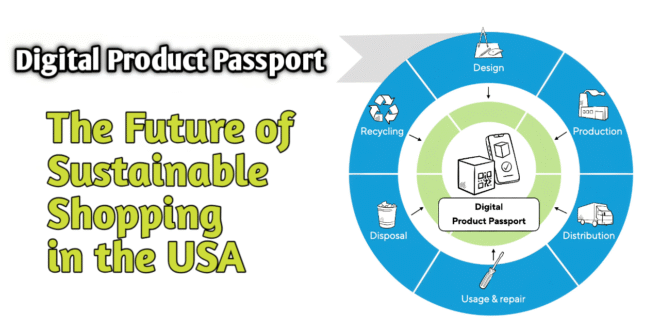What is a Digital Product Passport (DPP)?
Digital Product Passport: The Future of Sustainable Shopping in the USA is a digital record containing vital information about a product’s entire lifecycle—from sourcing and manufacturing to repair, recycling, and disposal. Think of it as a “digital ID” for products, helping consumers make informed, sustainable choices while assisting companies in achieving environmental and regulatory goals.
Why Digital Product Passports are Trending in the U.S.
With rising awareness around climate change and ethical sourcing, U.S. consumers and companies are increasingly demanding transparency. Digital Product Passports are becoming a vital tool to:
- Track carbon footprints and material sources
- Encourage recycling, repairs, and reuse
- Meet international regulations (like the EU’s Ecodesign for Sustainable Products Regulation)
- Boost customer trust in sustainable products
How Digital Product Passports Work
Each DPP is stored digitally—often accessible via a QR code, NFC chip, or blockchain system. Here’s what it typically includes:
Section Details Included
- Material Origin Raw material sources, certifications (organic, recycled)
- Manufacturing Data Factory location, working conditions, energy used
- Repair Guidance Manuals, component specs, repairability score
- Recycling Info Instructions for safe recycling or disposal
- Ownership Chain (Optional) For second-hand sales or returns
- Sustainability Score Carbon, water, and energy metrics
Why It Matters for U.S. Consumers
Digital Product Passport: The Future of Sustainable Shopping in the USA empower Americans to shop smarter. Whether you’re buying sustainable clothing, electronics, or furniture, DPPs allow you to:
Verify product authenticity and origin
Support ethical brands
Understand environmental impact before purchase
Choose longer-lasting, repairable items

Industries Embracing Digital Product Passports
1. Fashion – Trace fabrics, dyes, and labor practices
2. Electronics – Highlight energy efficiency, recyclability, and repair instructions
3. Furniture – Provide sourcing info and sustainable disposal
4. Beauty & Cosmetics – Share ingredients, cruelty-free certifications, and packaging data
5. Automotive – Track materials, part reuse, and end-of-life management
USA and Global Regulations Driving DPP Adoption
Although Europe leads the regulation charge, U.S. businesses are preparing to comply to stay competitive in global markets. Big retailers, manufacturers, and startups alike are exploring DPP systems to future-proof their supply chains.
The Future of Digital Product Passports in the USA
As environmental awareness grows, DPPs will likely become a standard across industries. Early adopters in the U.S. have a unique opportunity to lead the market in responsible, data-driven innovation. Expect to see DPPs on everything from sneakers and laptops to packaging and home goods.
Best Free AI Tools for Productivity in 2025 (U.S. Users Edition)
 Social Hungama Hindi News, हिंदी न्यूज़ , Hindi Samachar, हिंदी समाचार, Latest News in Hindi, Sarkari Result
Social Hungama Hindi News, हिंदी न्यूज़ , Hindi Samachar, हिंदी समाचार, Latest News in Hindi, Sarkari Result




